Mikhail Gorbachev Worksheets
Do you want to save dozens of hours in time? Get your evenings and weekends back? Be able to teach about Mikhail Gorbachev to your students?
Our worksheet bundle includes a fact file and printable worksheets and student activities. Perfect for both the classroom and homeschooling!
Resource Examples
Click any of the example images below to view a larger version.
Fact File
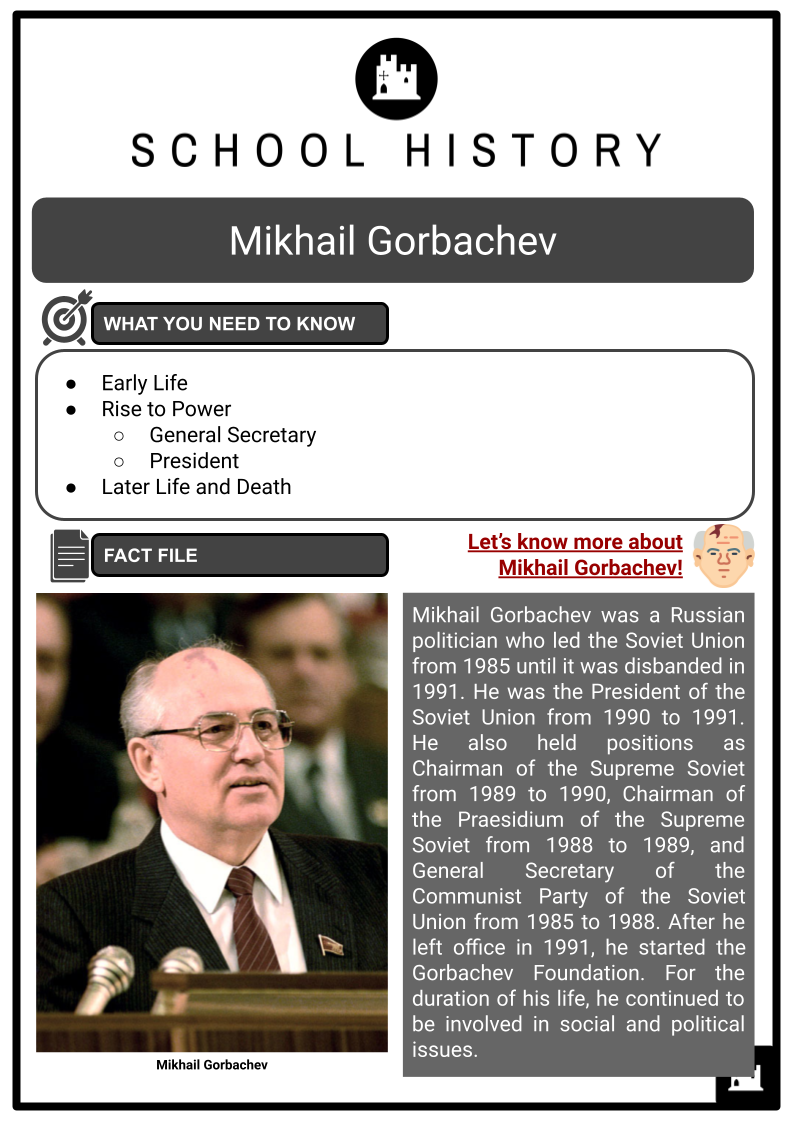
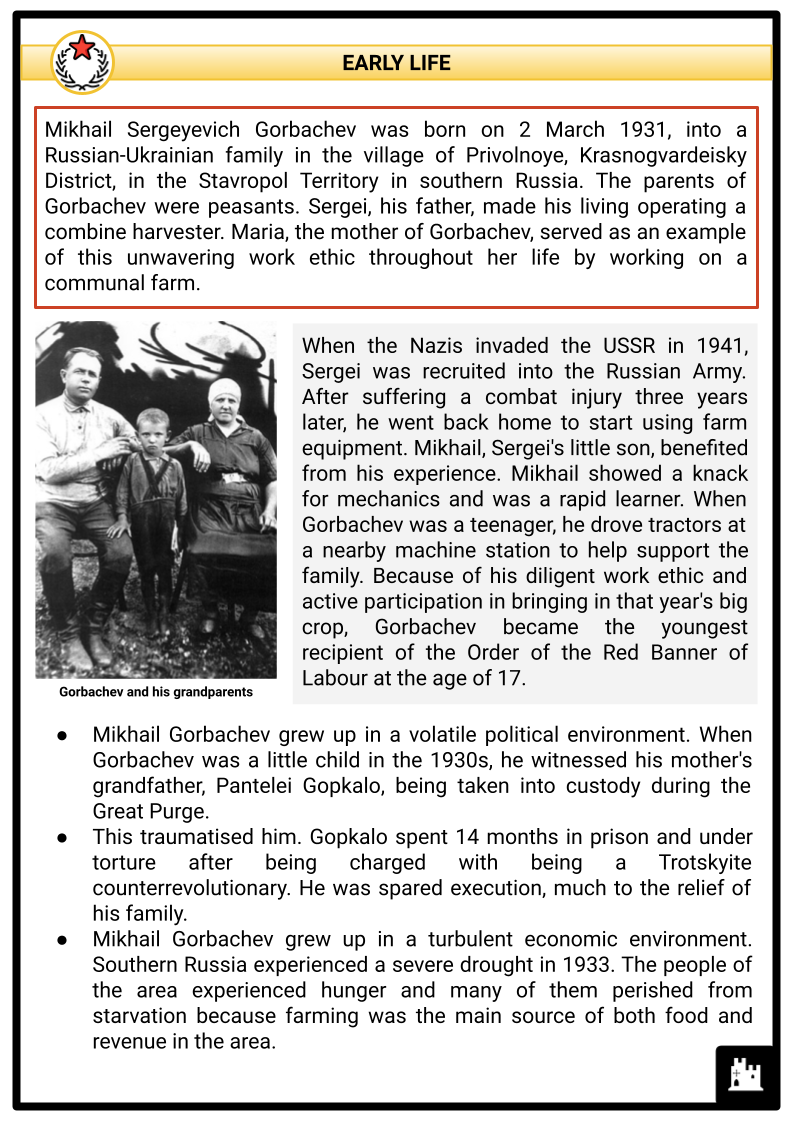
Student Activities
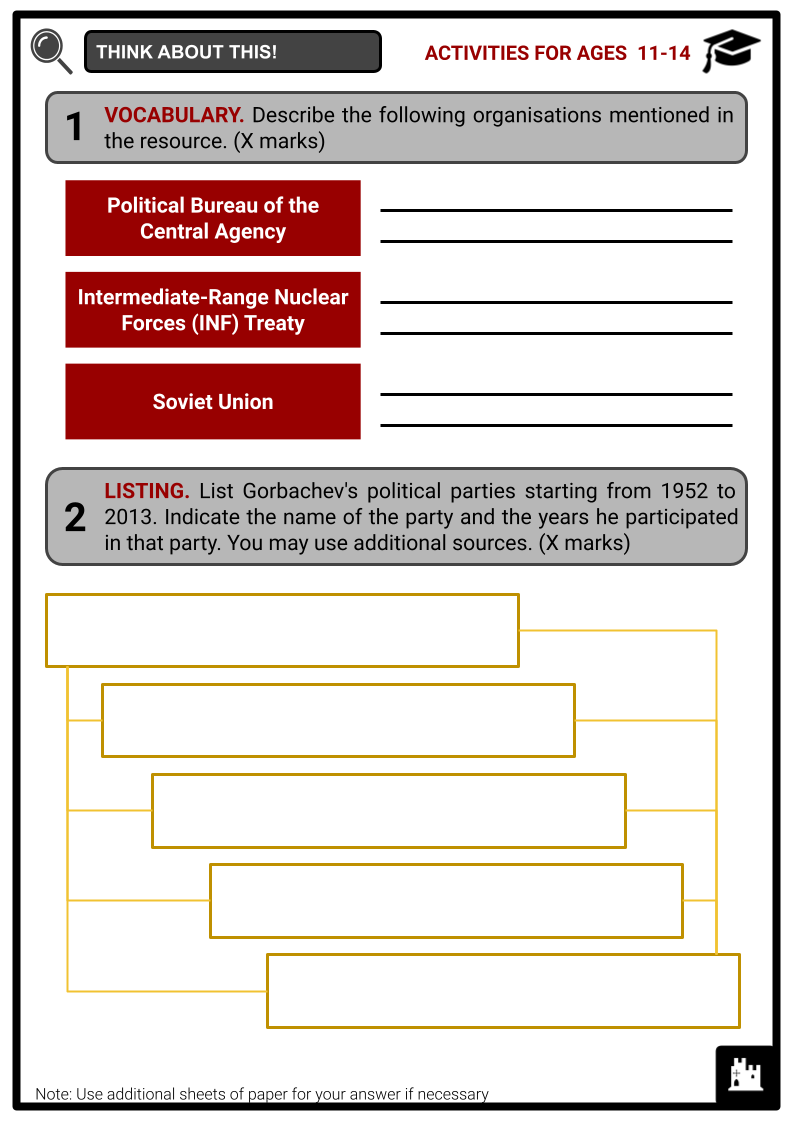
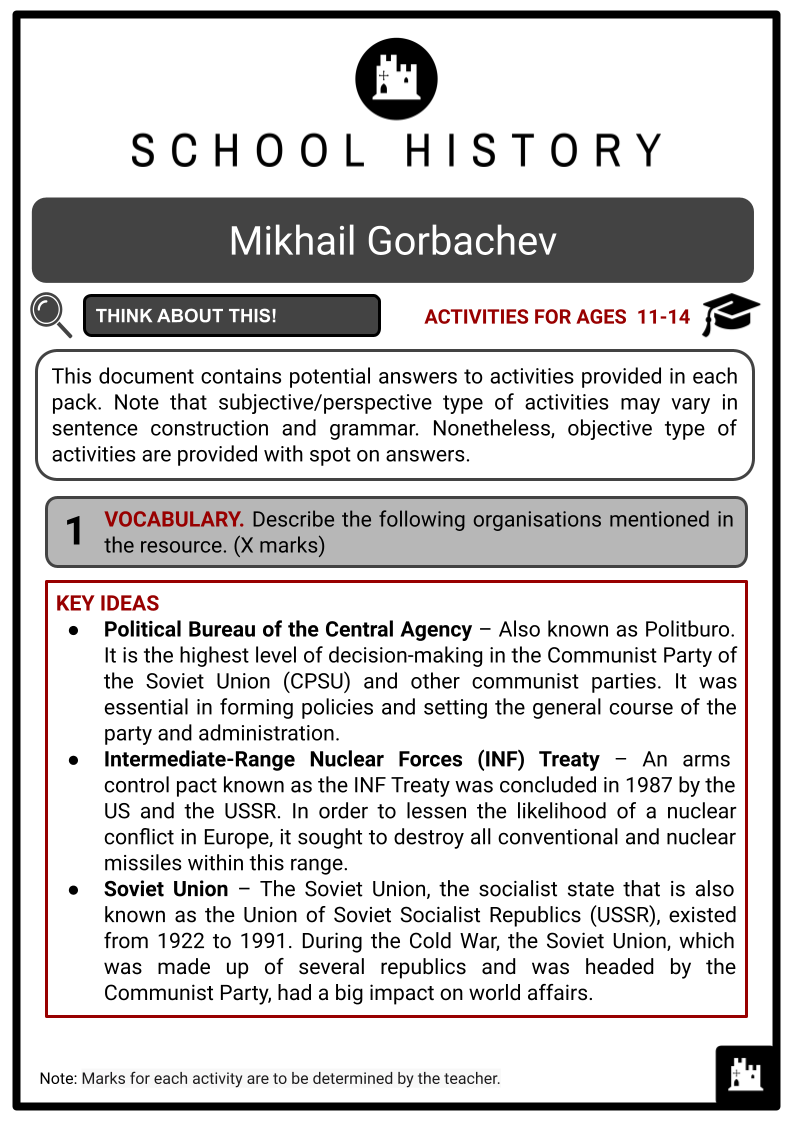
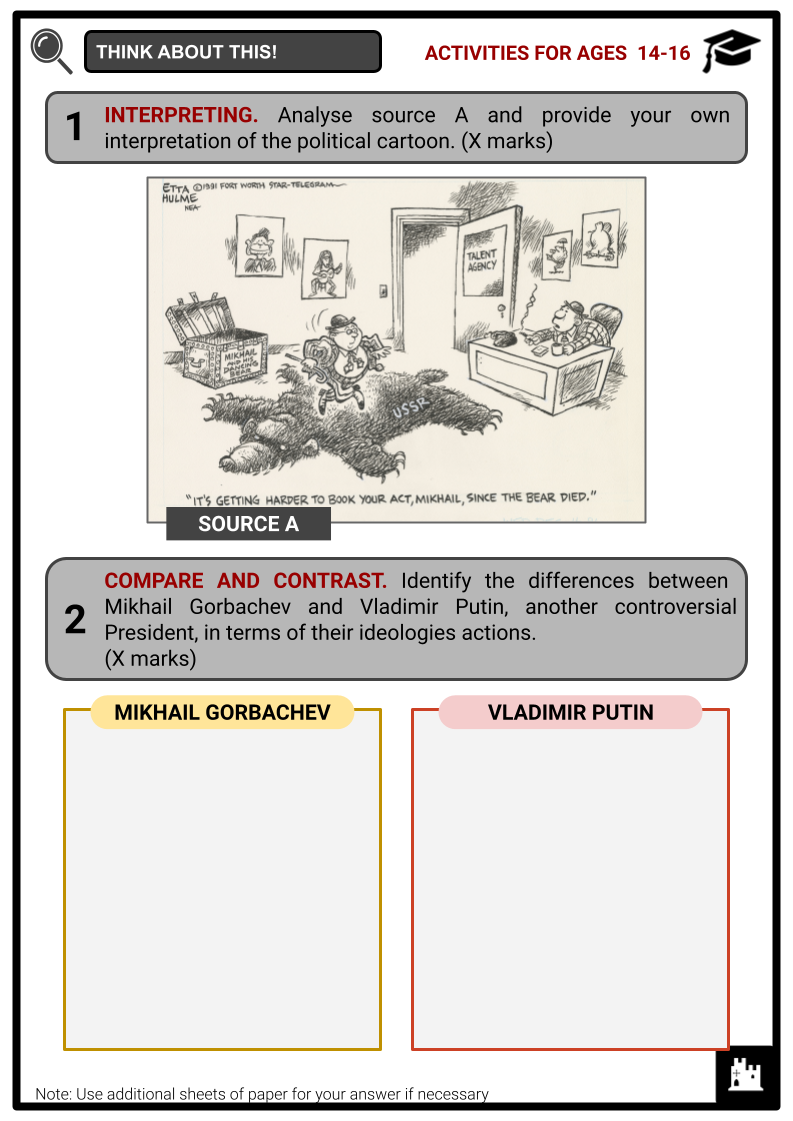
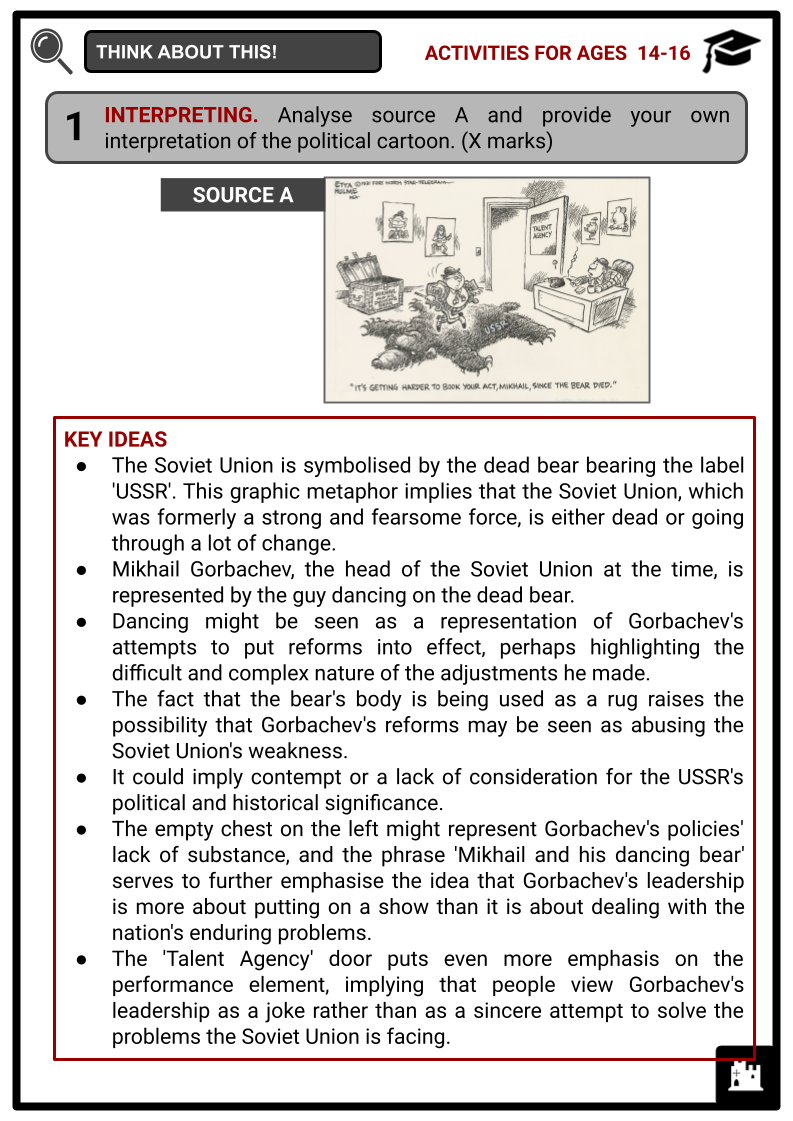
Summary
- Early Life
- Rise to Power
- General Secretary
- President
- Later Life and Death
Key Facts And Information
Let’s know more about Mikhail Gorbachev!
Mikhail Gorbachev was a Russian politician who led the Soviet Union from 1985 until it was disbanded in 1991. He was the President of the Soviet Union from 1990 to 1991. He also held positions as Chairman of the Supreme Soviet from 1989 to 1990, Chairman of the Praesidium of the Supreme Soviet from 1988 to 1989, and General Secretary of the Communist Party of the Soviet Union from 1985 to 1988. After he left office in 1991, he started the Gorbachev Foundation. For the duration of his life, he continued to be involved in social and political issues.
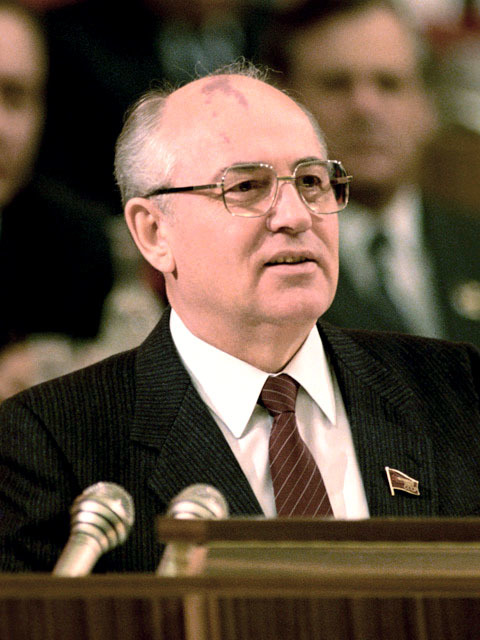
EARLY LIFE
- Mikhail Sergeyevich Gorbachev was born on 2 March 1931, into a Russian-Ukrainian family in the village of Privolnoye, Krasnogvardeisky District, in the Stavropol Territory in southern Russia. The parents of Gorbachev were peasants. Sergei, his father, made his living operating a combine harvester. Maria, the mother of Gorbachev, served as an example of this unwavering work ethic throughout her life by working on a communal farm.
- When the Nazis invaded the USSR in 1941, Sergei was recruited into the Russian Army. After suffering a combat injury three years later, he went back home to start using farm equipment. Mikhail, Sergei's little son, benefited from his experience. Mikhail showed a knack for mechanics and was a rapid learner. When Gorbachev was a teenager, he drove tractors at a nearby machine station to help support the family. Because of his diligent work ethic and active participation in bringing in that year's big crop, Gorbachev became the youngest recipient of the Order of the Red Banner of Labour at the age of 17.
- Mikhail Gorbachev grew up in a volatile political environment. When Gorbachev was a little child in the 1930s, he witnessed his mother's grandfather, Pantelei Gopkalo, being taken into custody during the Great Purge.
- This traumatised him. Gopkalo spent 14 months in prison and under torture after being charged with being a Trotskyite counterrevolutionary. He was spared execution, much to the relief of his family.
- Mikhail Gorbachev grew up in a turbulent economic environment. Southern Russia experienced a severe drought in 1933. The people of the area experienced hunger and many of them perished from starvation because farming was the main source of both food and revenue in the area.
- Gorbachev joined the Communist Party as a candidate in high school, but he was not given full membership until he was a student at Moscow University in 1952. After graduating, Gorbachev returned to Stavropol and accepted a job at the region's prosecutor's office.
- Not long after taking the position, Gorbachev bumped into some old friends. They had known him from his time in high school when he was active in the Young Communist League. They urged Gorbachev to take up the position of deputy director of propaganda for the local Communist Youth League's territorial committee as he had demonstrated his dedication and organisation.
RISE TO POWER
- Young Communist Party activists found an exciting environment in the Soviet Union during the political restructuring process, which had begun two years before the death of Soviet Premier Joseph Stalin. After barely ten days on the job, Gorbachev, eager to become engaged, accepted the offer and resigned from the prosecutor's office.
- Gorbachev advanced through the Communist League ranks gradually.
- He was appointed first Secretary of the Komsomol Committee of Stavropol City in 1956.
- He was designated as a delegate to the party congress in 1961.
- Gorbachev developed his political career and broadened his understanding of economics and agriculture during the 1960s, rising to the post of party leader and regional agricultural administrator.
- When Gorbachev was admitted as a full member of the Politburo, also called the Political Bureau of the Central Agency, the executive council for various Communist Party factions, in 1980, it marked a significant turning point in his rapidly developing political career.
- Yuri Andropov, the Communist Party's general secretary and Gorbachev's mentor at the Kremlin, passed away in 1984. In addition to being a significant year in Gorbachev's life narrative, 1984 saw him meet British Prime Minister Margaret Thatcher, with whom he would go on to become a close friend.
General Secretary
- After Andropov's successor, Konstantin Chernenko, passed away in 1985, Gorbachev was chosen to serve as the Communist Party's General Secretary. Serious internal concerns and rising Cold War tensions were among the challenges that Andropov and Chernenko had been unable to resolve when they came to Gorbachev's desk. Nonetheless, the Soviet Union felt that a new generation of leaders bent on constructive change had taken over thanks to Gorbachev's young vigour and excitement.
- Gorbachev and US President Ronald Reagan got involved in an expensive race to gather nuclear weapons in space when Gorbachev was general secretary. The cost significantly burdened the Soviet economy, which was already in trouble. Gorbachev put a lot of effort into enacting changes because he thought they would raise the level of living in the Soviet Union. He aimed for 'glasnost' and 'perestroika', openness and reformation, by giving the Soviets more freedom and democracy. His goal was to create a more socially conscious commercial economy. The goals of Gorbachev's reforms were cutting waste and raising production.
- Reagan and Gorbachev met at four more summits over the course of the following three years, during which time their friendship grew even closer as they worked together to end the Cold War. In addition to Reagan and Thatcher, Gorbachev fostered close relations with West German chancellor Helmut Kohl at this time.
- Regrettably, the Chernobyl nuclear power plant explosion in the Ukraine on 26 April 1986 severely damaged US–Soviet ties. It took the Soviet Union almost two weeks after the incident to publish a comprehensive report. Some viewed Gorbachev's response as insincere given his 'openness' agenda.
- The tension between Reagan and Gorbachev was evident during the summits in Geneva in 1985 and Reykjavik in October 1986.
- Reagan and Gorbachev differed in their support for the creation of a Strategic Defence Initiative.
- Both summits came to an end. Gorbachev conceded to Reagan's case at the end of 1987.
- The Soviet Union's economy was in serious trouble at this time. Gorbachev's attempts at economic reform were failing.
- The first-ever mutual agreement on reducing nuclear weapons was the Intermediate-Range Nuclear Forces (INF) Treaty, which was signed by Reagan and Gorbachev in 1987.
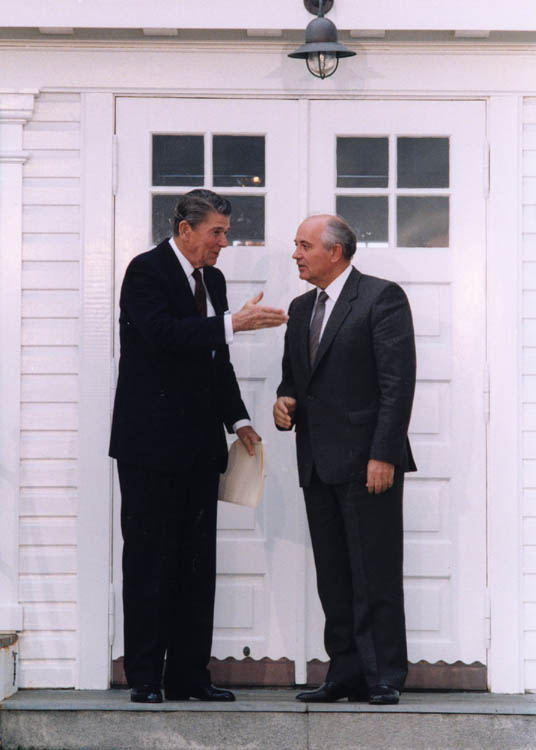
- The Soviet Union was relieved to get a much-needed respite from the costs associated with the space race.
President
- One of Gorbachev's main political initiatives was the introduction of a new, more democratic election system. He set up elections in 1989 when candidates from the Communist Party had to face off against independents. He annulled the USSR constitution's special status for the Communist Party. Based on democratic elections, state authority was transferred to the USSR's first parliament, the Congress of People's Deputies. Gorbachev became the first President of the Soviet Union on 15 March 1990, when he was chosen by the Congress of People's Deputies.
- Gorbachev pushed for more harmonious ties between nations while in office. He gave the order for Soviet forces to leave Afghanistan. Gorbachev also played a key role in bringing an end to the Cold War through his nonviolent discussions with President Reagan.
- He was also acknowledged for playing a significant part in the collapse of the Berlin Wall and the ensuing reunification of Germany. On 15 October 1990, Gorbachev received the Nobel Peace Prize in recognition of his outstanding leadership and contributions to the advancement of global development.
- Along with managing international disputes, Gorbachev addressed urgent problems within the Soviet Union.
- While certain ethnic groups in the USSR, like the Ukrainians and Lithuanians, wanted independence, other ethnic groups started to wage war against one another.
- While Gorbachev was attempting to manage these divisions and the still unstable Soviet economy, a new adversary entered the picture.
- The emphasis of former Communist Party member Boris Yeltsin was on drastic economic reforms.
- Yeltsin was elected President of the Russian Republic in the summer of 1991. Gorbachev now had to figure out how to maintain a balance of power between himself and the head of the opposition.
- Gorbachev was overthrown in a coup by Communist conservatives in August 1991 while on holiday in Crimea. Prime Minister Pavlov, whom Gorbachev had employed to assist him in maintaining a balance of power with Yeltsin, was one of the conservative members of the Communist Party that orchestrated the coup. Yeltsin spearheaded a struggle against the coup despite his opposition, and in the end, the rebellion was thwarted.
- Rumours that Gorbachev was working with the coup leaders began to surface after he returned home. The people began to doubt Gorbachev and were more and more in favour of Yeltsin, who they now saw as a hero. The Soviet Union had collapsed by Christmas 1991. It seemed inevitable that Gorbachev would resign as president of the Soviet Union, giving Yeltsin total authority.
LATER LIFE AND DEATH
- In an effort to reduce military and political hostilities between the US and the Soviet Union, Gorbachev collaborated with US President Ronald Reagan. Gorbachev contributed to the end of the Cold War in this way. The Norwegian Nobel Committee chose to give Mikhail Sergeyevich Gorbachev the Nobel Peace Prize for 1990 in recognition of his pioneering role in the peace movement that still defines significant segments of the global society today.
- After the dissolution of the Soviet Union in 1991, Mikhail Gorbachev faced a tumultuous post-USSR life marked by political challenges and personal transformations. Initially, he continued his political career by establishing the Social Democratic Party of Russia in 2001, but the party failed to gain significant traction. Gorbachev faced criticism for his role in the demise of the Soviet Union, and his popularity waned in Russia. In 1996, he made an unsuccessful bid for the Russian presidency, further diminishing his political influence.
- Amid financial struggles, Gorbachev took on various ventures, including lecturing internationally and engaging in business activities. However, these endeavours were met with mixed success. Gorbachev also became involved in humanitarian and environmental causes, founding the Gorbachev Foundation in 1992 to address global issues. Despite his reduced political influence, he continued to advocate for democracy, social justice and nuclear disarmament on the global stage.
- In the later years of his life, Gorbachev faced health challenges, including heart issues. Nevertheless, he remained active in public life, occasionally commenting on domestic and international affairs. Gorbachev's post-USSR life reflects a complex journey, marked by attempts to find a new role in the changing political landscape, financial struggles and a commitment to global issues.
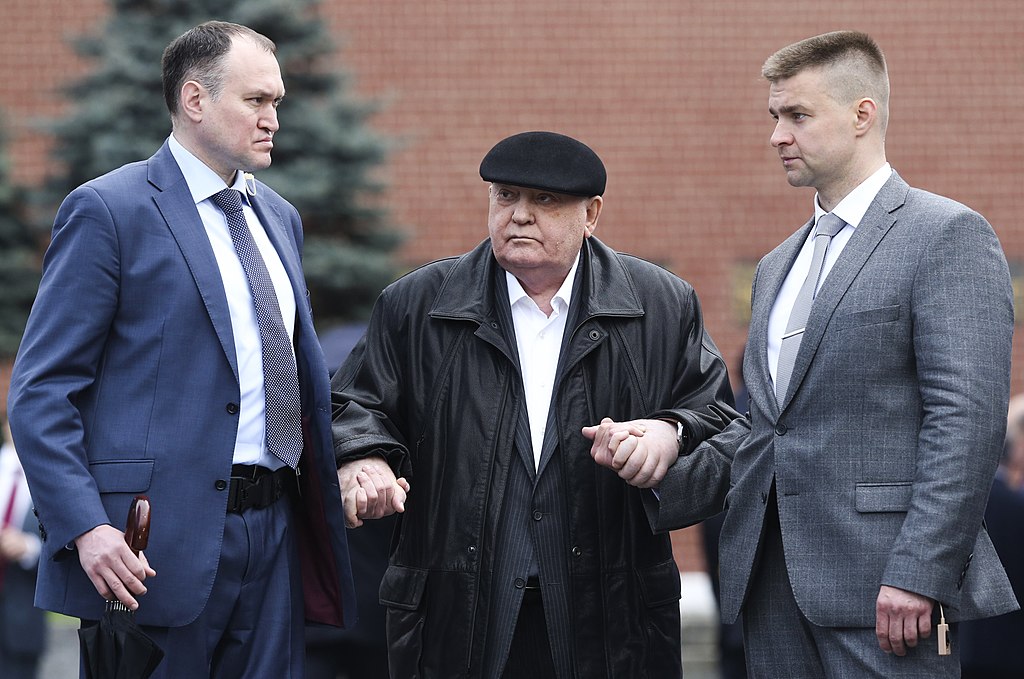
- In the years leading up to his death, Gorbachev experienced severe diabetes, necessitating multiple surgeries and hospital stays.
- In April 2011, Gorbachev underwent complex spinal surgery in Germany at the Munich clinic Schön Klinik München Harlaching.
- On 11 June 2013, news emerged that Gorbachev had been hospitalised for a routine examination, and two months prior, he had missed the funeral of Margaret Thatcher due to health reasons.
- On 22 October 2013, it was reported that Gorbachev was undergoing another examination in a German clinic.
- He was also admitted to the Central Clinical Hospital on 9 October 2014. In the same year, Gorbachev underwent oral surgery.
- Gorbachev experienced a brief hospitalisation in May 2015.
- In November 2016, he had a pacemaker installed at the Moscow Central Clinical Hospital. Additionally, in 2016, Gorbachev underwent surgery to replace his lenses due to cataracts.
- In 2019, Gorbachev's hospital visits became more prolonged, culminating in a December hospitalisation for pneumonia. By the beginning of 2020, he was placed under continuous medical supervision. In July 2022, Gorbachev's health further declined as he developed kidney problems, necessitating a transfer for hemodialysis.
- In the period leading up to his death, Gorbachev underwent four additional operations, experienced significant weight loss, lost the ability to walk, and complained about health and appetite issues in interviews. Ultimately, he received palliative care, occasionally leaving the hospital, but passing away on 30 August 2022, at approximately 10pm Moscow time after arriving for another hemodialysis.
Image Sources
- https://en.wikipedia.org/wiki/Mikhail_Gorbachev#/media/File:RIAN_archive_850809_General_Secretary_of_the_CPSU_CC_M._Gorbachev_(crop).jpg
- https://en.wikipedia.org/wiki/Mikhail_Gorbachev#/media/File:Gorbachev_and_Reagan_1986-4.jpg
- https://en.wikipedia.org/wiki/Mikhail_Gorbachev#/media/File:Gorbachev_2019.jpg
Frequently Asked Questions
- Who is Mikhail Gorbachev?
Mikhail Gorbachev is a former Soviet statesman who served as the General Secretary of the Communist Party of the Soviet Union from 1985 to 1991 and the country's president from 1990 to 1991.
- What were Mikhail Gorbachev's reforms called?
Gorbachev's reforms were known as "perestroika," which means "restructuring," and "glasnost," which means "openness" or "transparency." These policies aimed to modernise and liberalise the Soviet political and economic systems.
- What role did Mikhail Gorbachev play in the reunification of Germany?
Gorbachev's policies of perestroika and glasnost created an atmosphere of political change and openness in Eastern Europe, ultimately leading to the fall of the Berlin Wall in 1989 and the reunification of Germany in 1990.
